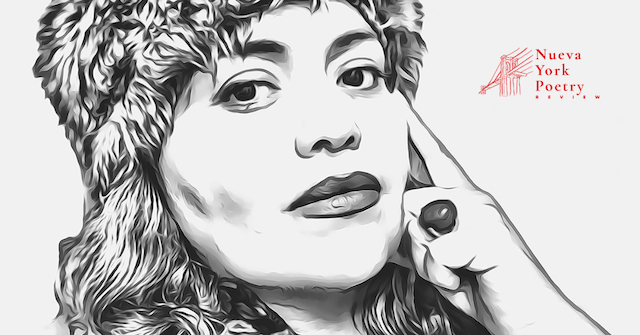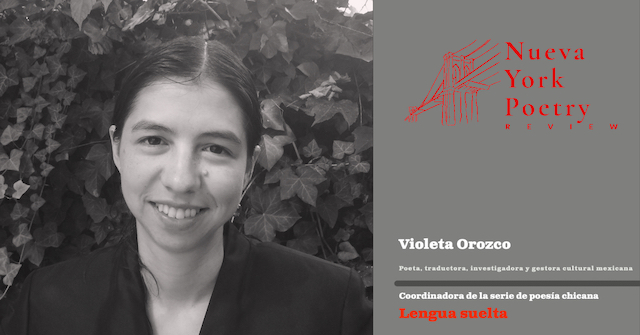
ONE DAY I COULD SEE DEATH
One day I could see death,
so I did what I could do—
I called her spirit back.
Sitting across from her,
she sank in the quicksand
of her words: “I’ve been crying
for a year and a half.”
One day just like that
I could see death,
so I threw a fishing rod
across the desk and reeled her in
with stories because I too
had once been in that drowning place.
Day in and day out I too had witnessed
the heaviness of purple waves with eternal
blueless skies pressing down on my gills.
So I asked, “Do you know why I stopped crying?”
while she held her head above water
and silence escaped her gaping mouth.
For several months, I fell asleep crying.
One day when I woke up,
where there had been two obsidian eyes
with heightened sight
were two-ball black head pins.
Where there had been two plump cheeks
were now two sunken salty creeks.
Where there had been a mouth,
a selfless drought had sealed my lips shut.
Until the day of the calling,
from my Mexican bathroom mirror,
María Felix and my mother reached out,
so I could reclaim my beauty,
and remember what it was like to be me—
a soldadera armed with a lasso tongue,
graced with thorny cactus skin
and self-healing entrails.
From the treacherous current,
I pulled her in with stories
as I removed seaweed
and the salty pearls from her eyes.
I locked her arm with mine
as we giggled and walked back to shore,
and the salt of her eyes receded.
Moraleja para una mujer: Salt water belongs
in the ocean not on a woman’s lunaface.
“One Day I Could See Death,” originally published in Ana Castillo’s La Tolteca #6.
UN DÍA PUDE VER LA MUERTE
Un día pude ver la muerte,
entonces hice lo que pude—
llamé a su espíritu para que regresara.
Sentada enfrente de ella,
se hundió en la arena movediza
de sus palabras:
“Llevo llorando
un año y medio.”
Un día, así como si nada
pude ver a la muerte,
entonces lancé una caña de pescar
al otro lado del escritorio y la jalé
con historias porque yo también
alguna vez estuve en ese lugar de ahogo.
De día y de noche yo también llegué a atestiguar
la pesadez de las moradas olas con eternos
cielos desazulados oprimiendo mis agallas.
Entonces le pregunté, “¿Sabes por qué dejé de llorar?”
mientras mantuvo su cabeza por encima del agua
y el silencio se escapó de su boca entreabierta.
Por varios meses me fui a dormir llorando.
Un día cuando me levanté
allí donde hubo dos ojos de obsidiana
con vista aguzada
había dos alfileres de bolita.
Donde había habido dos cachetes rellenitos
ahora había dos arroyuelos hundidos de agua salada.
Ahí donde había habido una boca,
una sequía egoísta había sellado mis labios hasta cerrarlos.
Hasta el día del llamado,
María Félix y mi madre estiraron sus manos
desde mi espejo de baño mexicano,
para que yo pudiera reclamar mi belleza,
y recordar cómo era eso de ser yo—
una soldadera armada con una lengua de látigo,
dotada de espinosa piel de cactus
y entrañas que se curan solas.
Desde la corriente traidora,
la jalé hacia mí con historias
mientras le quitaba las algas
y las perlas saladas de sus ojos.
Enganché su brazo al mío
mientras soltábamos risitas y caminábamos de regreso a la orilla
y la sal de sus ojos retrocedía.
Moraleja para una mujer: El agua salada pertenece
al océano, no a la lunacara de una mujer.
“One Day I Could See Death,” originalmente publicado en La Tolteca #6 de Ana Castillo
RESURRECTION
Those were the nights
I’d leave my bedroom window
open,
and chilly winds
lifted the curtain,
slipped inside my bedroom,
and curled beside me.
In the morning,
I’d hear a knock at the door.
I’d chirp, “—Come in.”
At the doorway,
a figure would ask,
“Aren’t you cold?
It’s cold in here.”
I’d shrug my shoulders
and answer, “Cold?
I don’t feel a thing.”
Those were the nights
when winter insisted on talking to me,
but I wouldn’t listen.
I couldn’t. I was deceased.
Not until months passed,
Cold, herself, with her icicle fingers,
gently patted my right cheek.
I turned to look at her,
and took notice of her
when one day I was no longer
a horizontal statue.
RESURECCIÓN
Aquellas eran las noches
en que yo dejaba la ventana de mi cuarto
abierta,
y las corrientes frías
levantaban la cortina,
se deslizaban dentro de mi cuarto
y se enroscaban junto a mí.
En la mañana,
podía escuchar un toquido en la puerta.
Yo canturreaba, “—Pase.”
En la entrada,
una figura preguntaba,
“¿Apoco no tienes frío?
Hace frío aquí.”
Yo alzaba los hombros
y respondía, “¿Frío?
No siento nada.”
Esas eran las noches
en las que el invierno insistía en hablarme,
pero yo no escuchaba. No podía.
Estaba muerta.
No fue hasta que pasaron los meses,
Cuando fría, ella misma, con sus dedos de témpano,
fue la que suavemente me acarició el cachete derecho.
Yo volteé a verla,
y me fijé en ella
el día en que dejé de ser
una estatua horizontal.
Have you ever been at the epicenter
of a black hole where people
speak to you through a tin can phone
stretched across a long gray string?
But no one—nothing—can reach
inside you.
I was there.
Have you ever been at the epicenter
of a black hole,
where your doppelgänger
stares at you
through a dusty bathroom mirror
as somber pressure
makes your dark circles
hang to your feet?
I was there.
I stood in dark matter.
Tepid water ran down my breasts
when my eyes opened to shards of light
and long dark tufts under my arms.
I was there
the day I stepped out of stone.
I stood in the shower
when the heaviness of grey
fell to my feet
and scurried down the drain.
Resurrection
Those were the nights
I’d leave my bedroom window
open,
and chilly winds
lifted the curtain,
slipped inside my bedroom,
and curled beside me.
In the morning,
I’d hear a knock at the door.
I’d chirp, “—Come in.”
At the doorway,
a figure would ask,
“Aren’t you cold?
It’s cold in here.”
I’d shrug my shoulders
and answer, “Cold?
I don’t feel a thing.”
Those were the nights
when winter insisted on talking to me,
but I wouldn’t listen. I couldn’t.
I was deceased.
Not until months passed by,
Cold, herself, with her icicle fingers,
gently patted my right cheek.
I turned to look at her—
took notice of her
when I no longer was
a horizontal statue.
SALIENDO DE LA PIEDRA
¿Alguna vez estuviste en el epicentro
de un hoyo negro en donde la gente
te hablaba a través de un teléfono de lata
estirado a lo largo de un hilo gris?
Pero nadie – nada– puede alcanzarte
allá dentro de ti.
Yo estuve ahí.
¿Alguna vez estuviste en el epicentro
de un hoyo negro
en donde tu doppelganger
se te quedaba mirando
a través de un espejo polvoso de baño
mientras una presión sombría
hacía que tus círculos oscuros
bajaran colgando hasta tus pies?
Yo estuve ahí.
De pie en la materia oscura.
Agua tibia bajaba por mis senos
cuando mis ojos se abrían a las esquirlas de luz
y hubo largos jirones oscuros bajo mis brazos.
Estuve ahí
el día en que salí de la piedra.
Me quedé quieta en la regadera
cuando la pesadez del gris
cayó a mis pies
y se escabulló por la coladera.
AN AMERICAN LANDSCAPE
On a chilly February night
under a star-spangled sky
Trayvon, you, stayed warm
fastened like a monk
in a Rembrandt painting.
As you talked
to your girlfriend,
your words sugared
with purple, green,
yellow, and the red
of your youth
took a cloaked past
when in the distance
a man’s four-hundred year old
gaze, clouded with a history
hanging with strange fruit,
set its eyes on you.
As you walked
through invisible
marked streets,
those pair of cutout holes,
carrying a holstered pistol,
preyed on someone like you.
And you ran
and wrestled
for freedom
in this American landscape,
looking for a place
to take root and extend
your long lean branches,
reaching for a limitless sky.
But one bullet gnawed
your heart and turned
your fingernails blue.
Those cutout holes
could never hear you,
“Stop following me!”
nor could they ever see
the prime green seventeen
of your youth.
Against a historical
American backdrop,
where saplings are lost,
a little man saw
an American TV monster
mightier than himself
and the only thing
that little man
could do was reach
for the trigger—
too late to learn your pockets
were stuffed with dreams
of you, Trayvon, wearing a pilot hat
flying through wistful blue skies
not pearls, not diamonds,
nor gold rings.
UN PAISAJE NORTEAMERICANO
En una noche fría de febrero
bajo de un cielo estrellado
Travyon, tú te quedaste calientito
Como un monje sujeto
A una pintura de Rembrandt.
Mientras le hablabas
A tu novia,
Tus palabras azucaradas
con el morado, verde,
amarillo y rojo
De tu juventud
Envolvieron el pasado en un manto
Cuando en la distancia
La mirada de cuatrocientos años
de un hombre, nublada de historia
donde colgaba fruta extraña, strange fruit,
Se detuvo en ti.
Mientras caminabas
a lo largo de invisibles
calles marcadas,
ese par de huecos recortados,
cargando una pistola enfundada
convirtió a alguien como tú en una presa.
Mas tú corriste
luchaste
Por la libertad
En este paisaje norteamericano,
Buscando un lugar
Para enraizarte y extender
Tus largas y delgadas ramas
Extendiéndote hacia un cielo ilimitado.
Pero una bala te mordió
El corazón y te tornó
Las uñas moradas.
Esos hoyos recortados
No pudieron jamás oírte,
"deja de seguirme!"
Ni tampoco serían capaces de ver jamás
Los verdes diecisiete en apogeo
De tu juventud.
Con esta historia
norteamericana de fondo
donde los arbolillos se pierden,
un hombre pequeño vio
un monstruo en la tele americana
más poderoso que él mismo
y la única cosa
que ese hombre pequeño
podía hacer era tratar de alcanzar
el gatillo-
pero era tarde para aprender que tus bolsillos
estaban llenos de sueños
de ti, Trayvon, usando un sombrero de piloto
volando a través de cielos melancólicos
que no eran de perlas, ni diamantes
ni anillos de oro.
Traducción: Violeta Orozco
Sonia Gutiérrez is the author of Spider Woman / La Mujer Araña (Olmeca Press, 2013) and the co-editor for The Writer’s Response (Cengage Learning, 2016). She teaches critical thinking and writing, women’s, gender, and sexuality studies, and multicultural studies. FlowerSong Press in McAllen, Texas, recently published her novel, Dreaming with Mariposas. Her bilingual poetry collection, Paper Birds / Pájaros de papel, is forthcoming in 2022. Presently, she is returning to her manuscript, Sana Sana Colita de Rana, moderating Facebook’s Poets Responding, and teaching in cyberland.
Sonia Gutiérrez es la autora de Spider Woman / La Mujer Araña (Olmeca Press, 2013) y co-editor de The Writer’s Response (Cengage Learning, 2016). Imparte asignaturas de pensamiento crítico, estudios de la mujer, género y sexualidad y estudios multiculturales. FlowerSong Press en McAllen, Texas, recientemente publicó su novela, Dreaming with Mariposas. Su poemario bilingüe, Paper Birds / Pájaros de papel se publicará en el 2022. En la actualidad, regresó a su obra Sana sana colita de rana, modera Facebook’s Poets Responding, y enseña en ciberlandia.
